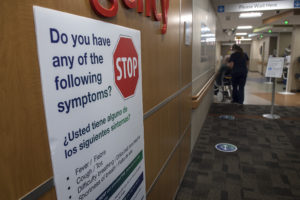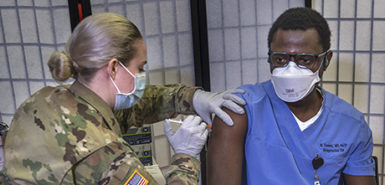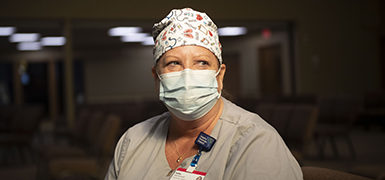
Anyone coping with a COVID-19 infection at home may wonder: When should I seek medical care? Or make a trip to the emergency department?
The reassuring news is that most people with COVID-19 will suffer the symptoms of an upper respiratory illness—fever, congestion and cough—that can be treated at home.
Most will get better on their own, said Josh Kooistra, DO, senior vice president and chief medical officer of Spectrum Health West Michigan.
“Unless you have underlying medical conditions or advanced age, most likely you are going to do just fine with COVID-19,” he said.
In general, those with a fever should remember to stay well hydrated, he said. And they can take acetaminophen for fever and body aches.
But as intensive care units fill with COVID-19 patients, there’s no denying an infection can cause serious illness. By mid-December, the pandemic killed more than 300,000 Americans and 1.6 million people worldwide.
Dr. Kooistra discussed the symptoms that should prompt those with COVID-19 to seek emergency care or contact their primary care provider.
Severe trouble breathing
“Shortness of breath is the major symptom we focus on when we are looking at severity of illness,” Dr. Kooistra said.
Shortness of breath can be classified as severe, moderate or mild.
Shortness of breath is considered severe when it occurs when a person is simply sitting still, or at rest. The person may not be able to speak in full sentences.
“That’s a sign of serious illness that you need to go to the emergency department to get checked out,” Dr. Kooistra said.
It can be a sign of acute respiratory distress syndrome, a life-threatening lung condition.
Moderate
Shortness of breath is considered moderate when it occurs during normal activities around the house, such as cooking dinner or tackling mild housework.
If that happens, you should at least let your primary care provider know.
And if you have additional risk factors, such as obesity, diabetes or underlying lung disease, “you should seek care in the emergency department,” Dr. Kooistra said.
Mild
Mild shortness of breath may occur when walking up a couple of flights of stairs.
“That’s less concerning if you are otherwise healthy. It’s a symptom that some patients with COVID-19 will get,” Dr. Kooistra said. “If they are otherwise healthy, they can probably stay home and monitor their symptoms. It is a good idea to check in with your health care provider.”
Other emergency symptoms
The Centers for Disease Control and Prevention also recommends seeking emergency medical care, either by calling 911 or going to the emergency department, in the following situations:
- Persistent pain or pressure in the chest
- New confusion
- If the patient can not be awakened or stay awake
- Bluish lips or face
Do not delay care
For any health emergency, patients should not avoid or delay medical care because of fears of COVID-19.
“We can provide safe care, whether you have COVID-19 or not,” Dr. Kooistra said.
Doctors have seen cases where patients postponed a trip to the emergency department for a life-threatening condition, such as a heart attack or stroke, and suffered consequences because they delayed care.
“It is far better to seek medical care and get the attention you need than to avoid that care because you are worried about COVID-19,” he said.

 /a>
/a>
 /a>
/a>
 /a>
/a>